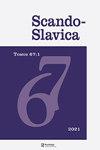From the Editor
IF 0.2
0 HUMANITIES, MULTIDISCIPLINARY
引用次数: 0
Abstract
Russia’s brutal invasion of Ukraine continues. The Swedish and Norwegian Associations of Slavists and the Society of Finnish Slavists strongly condemn Russia’s unprovoked and brutal invasion of its peaceful neighbour Ukraine. The Nordic Slavists express full support for Ukraine and the Ukrainian people in their struggle against the invaders for democracy and human dignity, and also express their solidarity with those courageous Russians who stand up in protest against the war. Many Nordic Slavists work on a daily basis disseminating knowledge of the Russian and Ukrainian languages, literatures and cultures. This work has now become more complicated, but also more necessary than ever. Scando-Slavica will do its utmost to continue to publish on topics within Slavic and Baltic linguistics, literature, culture, history and society, promoting the spread of research, irrespective of the country of origin of our colleagues. The topics addressed by the contributors to the present issue of ScandoSlavica include language and literature in several Slavic countries: In her article, Katarzyna Glinianowicz discusses the discourse of sexuality in the prose of the Ukrainian writer Ivan Franko (1856–1916), but also attempts to examine more broadly the genealogy of the representation of sexuality and gender in contemporary Ukrainian culture. The articles by Alexander Lifshits, Pavel Uspenskij & Tatiana Krasilnikova, and Tintti Klapuri & Jenniliisa Salminen offer analyses of different aspects of both classical and modern literature written in Russian: the creation of the psychological authenticity of the protagonist in Nikolaj Gogol′’s comedy Revizor, Ivan Chlestakov, the role of idioms in Boris Pasternak’s collection of poems Vtoroe roždenie (‘The Second Birth’, 1932), and the connection between collective memory and fictional spatiality in recent works by Ljudmila Ulickaja, Elena Čižova, and Guzel′ Jachina. Evgeny Steiner offers an analysis of Russian attitudes to Japan, based on the memoirs of the Russian priest, Esperantist and utopist Innokentyj Seryšev (1883–1976), who lived in Japan at the beginning of the 1920’s. In their article, Anna Litvina & Fjodor Uspenskij discuss the medieval Russian anthroponymic system through a detailed analysis of the personal names of the sixteenth-century Muscovite official Andrej Ščelkalov. Articles by Tore Nesset and Andrey Gorbov analyse grammatical issues in contemporary Russian: Russian constructions corresponding to Norwegian来自编辑
俄罗斯对乌克兰的野蛮入侵仍在继续。瑞典和挪威斯拉夫主义者协会以及芬兰斯拉夫主义者协会强烈谴责俄罗斯无端和野蛮入侵其和平邻国乌克兰。北欧斯拉夫主义者表示充分支持乌克兰和乌克兰人民为争取民主和人类尊严而同侵略者进行的斗争,并表示声援那些勇敢地站起来抗议战争的俄罗斯人。许多北欧斯拉夫主义者每天都在传播俄语和乌克兰语言、文学和文化的知识。这项工作现在变得更加复杂,但也比以往任何时候都更有必要。Scando-Slavica将尽最大努力继续发表关于斯拉夫和波罗的海语言学、文学、文化、历史和社会的主题,促进研究的传播,无论我们的同事来自哪个国家。本期《ScandoSlavica》的撰稿人讨论的主题包括几个斯拉夫国家的语言和文学:在她的文章中,Katarzyna Glinianowicz讨论了乌克兰作家Ivan Franko(1856-1916)的文章中的性话语,但也试图更广泛地研究当代乌克兰文化中性和性别表现的谱系。Alexander Lifshits、Pavel Uspenskij和Tatiana Krasilnikova以及Tintti Klapuri和Jenniliisa Salminen的文章从不同的角度分析了用俄语写的古典和现代文学:尼古拉·果戈理的喜剧《雷维佐尔》中主人公心理真实性的创造,伊万·切列斯塔科夫,鲍里斯·帕斯捷尔纳克诗集《维克多》roždenie(《第二次出生》,1932年)中习语的作用,以及Ljudmila Ulickaja、Elena Čižova和Guzel Jachina近期作品中集体记忆和虚构空间之间的联系。叶夫根尼·施泰纳根据20世纪20年代初居住在日本的俄罗斯牧师、世界语主义者和乌托邦主义者Innokentyj Seryšev(1883-1976)的回忆录,分析了俄罗斯人对日本的态度。在他们的文章中,Anna Litvina和Fjodor Uspenskij通过详细分析16世纪莫斯科官员Andrej Ščelkalov的人名,讨论了中世纪俄罗斯的人名系统。托尔·内塞特和安德烈·戈尔波夫的文章分析了当代俄语中的语法问题:与挪威语相对应的俄语结构
本文章由计算机程序翻译,如有差异,请以英文原文为准。
求助全文
约1分钟内获得全文
求助全文

 求助内容:
求助内容: 应助结果提醒方式:
应助结果提醒方式:


